The secret to awakening emotions when learning literature
For Tran Minh Ha, just mentioning the two words "Miss Xuyen" is a source of inspiration for writing that seems to naturally come flooding back. Minh Ha recounts that Miss Xuyen's literature classes are like watching a dramatic and emotional movie. There, the characters are no longer strange, dry names in textbooks, but become lively people, with laughter, tears, fate and even worries like anyone else in real life.
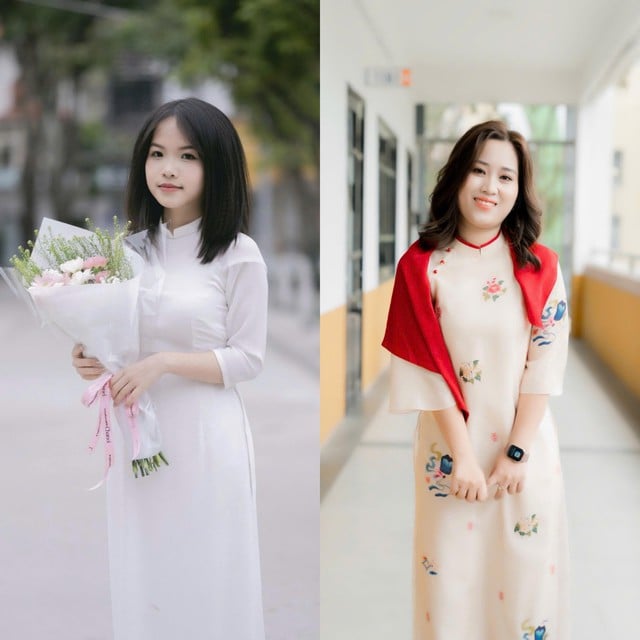
Ms. Nguyen Thi Xuyen (right) and literature valedictorian Tran Minh Ha. It is known that Ms. Xuyen has 15 years of experience in the education sector, and has had students achieve high scores for many consecutive years in the high school exam preparation.
Photo: NVCC
Ms. Xuyen often has a favorite saying that is deeply imprinted in the minds of her students: "Literature is life, so don't write like a machine." It was that reminder that helped Minh Ha realize that writing is not simply about arranging words in the right structure or following a pre-existing pattern. It is a process of putting your heart, soul and most genuine feelings into each paragraph, each line.
To do that, Ms. Xuyen not only teaches, but she "tells" stories, "creates" scenes, and "recreates" the characters' emotions, making students feel like they are immersed in a vivid literary world .
Minh Ha honestly shared that before the exam, there was a time when she fell into a state of depression to the point of wanting to give up. Literature suddenly became a burden, the pages of the book seemed lifeless. However, thanks to the learning method of "reading literature with the soul" that Ms. Xuyen suggested, Minh Ha gradually found the connection with literature. She began to immerse herself in each sentence, imagining herself talking to the character, even "pretending a little" when listening to soft music and closing her eyes to imagine the setting of the work. Perhaps it was that "pretending", the daring to live fully with her emotions that helped her maintain a sweet, strong connection with literature. A connection should never be limited by the rigid structure of 3 parts: introduction, body and conclusion, but must be the free flow of emotions and thoughts.
Having been attached to the podium for nearly 15 years, Ms. Xuyen could not hide her emotions when mentioning her little student's score of 9.75 in the recent 2025 high school exam. "It was a feeling that I did not dare to imagine in my dreams, but now it has come true. I was overwhelmed with happiness, because it was not just a score, but the result of a long journey full of love, patience and understanding between teacher and student," she shared with a choked voice. For her, this is not a victory of mere knowledge, but the clearest proof that: when teachers are dedicated enough, passionate enough, students will be inspired enough to reach out, to fly high, to fly far on the wings of knowledge and emotion.
"Just write the truth, I'll fix the rest"
Not only does she turn her lessons into vivid films, Ms. Xuyen also infuses them with a very real emotion - dedication. She does not hesitate to spend time talking privately with each student, listening to even the smallest concerns that seem unimportant. It could be a complaint: "I don't understand this part today, teacher!", or a hesitant question: "I feel like I wrote this sentence... badly, please help me check it", or sometimes simply a casual confession: "Teacher, I'm so sad today!".
For Minh Ha, it was this sincere, non-judgmental listening that helped her gain more confidence when she started writing. She knew that behind every test, every less-than-perfect submission, there was always a teacher willing to read, give detailed comments, and accompany her like a great friend. Simple but powerful words of encouragement such as: "I believe you can write better" or "This time the idea is not very clear, but you are on the right track" became a small light, guiding Minh Ha on her challenging journey of learning literature. A journey that sometimes does not need flowery words, but only sincerity is enough to ignite a lasting, unquenchable flame of passion.
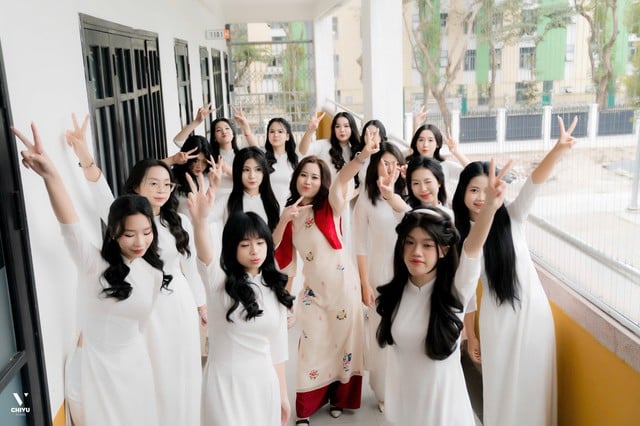
For Ms. Xuyen, each student is a "literary personality" that needs to be respected, explored and nurtured.
Photo: NVCC
During the review process, Ms. Xuyen never imposed or forced students to write according to a certain template, or "memorize" sample essays. On the contrary, she encouraged them to find their "own voice", to freely experiment, to write, to make mistakes and to correct. Minh Ha clearly remembers Ms. Xuyen's familiar message, like a guideline: "Just write truthfully, let me correct the rest". That has become a solid foundation for students to overcome their fear, to dare to write their own feelings, not following a pattern, not copying, but completely coming from their hearts and independent thinking.
For Ms. Xuyen, each student is a "literary personality" that needs to be respected, discovered and nurtured. She does not teach literature as a dry subject, but as a guide to a vast world where emotions are the root of all creativity and reason is the lamp that lights the way. She often lets students experience "being a literature teacher" by organizing peer-grading sessions, asking critical questions, debating and drawing their own conclusions.
Minh Ha said that Ms. Xuyen's "one-on-one interview" style tests of old lessons made her students both "nervous" and "excited", with one student even exclaiming: "It's more stressful than taking the university entrance exam!".
Literature is a journey of emotional accumulation.
When asked about her exam preparation tips, Ms. Xuyen shared that she always sends out detailed review plans from the weekend before so that students can proactively prepare and plan a suitable study schedule. Not only does she provide a system of differentiated exercises, from basic to advanced, she also inspires passion through activities outside of textbooks. She encourages students to read more books, newspapers, literary works outside the curriculum, to feel their favorite characters in their own way, and to practice writing skills from the simplest things in daily life. "Literature is no longer a subject to memorize, but a long journey to practice critical thinking, the ability to perceive and express one's own emotions," she emphasized.
From that journey, her students gradually formed the habit of self-study and persistent self-training: writing an essay every week, sending it to her for comments, then rewriting it, and writing again. Personal reflections on a poem or a character were no longer forced tasks, but became a way for them to keep their emotions fresh, not boring, not mechanical. Thanks to that, literature was no longer a fear, but even became beautiful, a place for them to express themselves.
As for Ms. Xuyen, Minh Ha's achievement of 9.75 is not just an impressive score. It is the happiness of seeing a student dare to love literature again from the beginning; dare to try, dare to write, dare to make mistakes and dare to live true to her most genuine emotions. She sends a meaningful message to future generations of students: "Learn literature not just for exams, but to be yourself, to understand more about life and about people."
Source: https://thanhnien.vn/co-giao-tiet-lo-bi-quyet-giup-hoc-tro-dat-thu-khoa-mon-van-voi-975-diem-185250717121138463.htm




![[Photo] Keep your warehouse safe in all situations](https://vphoto.vietnam.vn/thumb/1200x675/vietnam/resource/IMAGE/2025/10/1/3eb4eceafe68497989865e7faa4e4d0e)
![[Photo] President of the Cuban National Assembly visits President Ho Chi Minh's Mausoleum](https://vphoto.vietnam.vn/thumb/1200x675/vietnam/resource/IMAGE/2025/10/1/39f1142310fc4dae9e3de4fcc9ac2ed0)
![[Photo] Hanoi morning of October 1: Prolonged flooding, people wade to work](https://vphoto.vietnam.vn/thumb/1200x675/vietnam/resource/IMAGE/2025/10/1/189be28938e3493fa26b2938efa2059e)



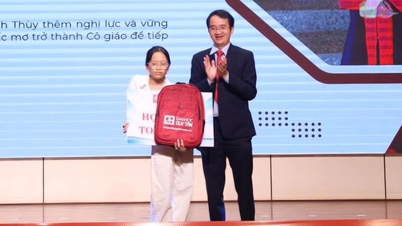


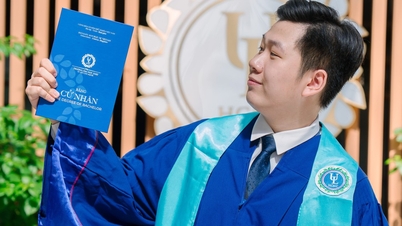









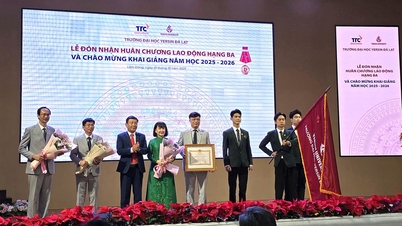
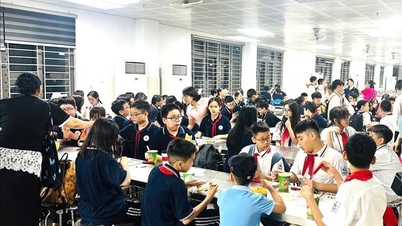





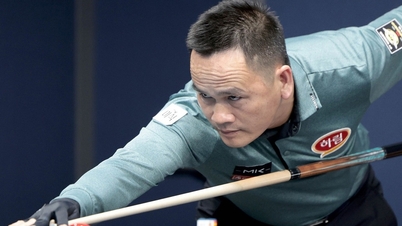




































































Comment (0)